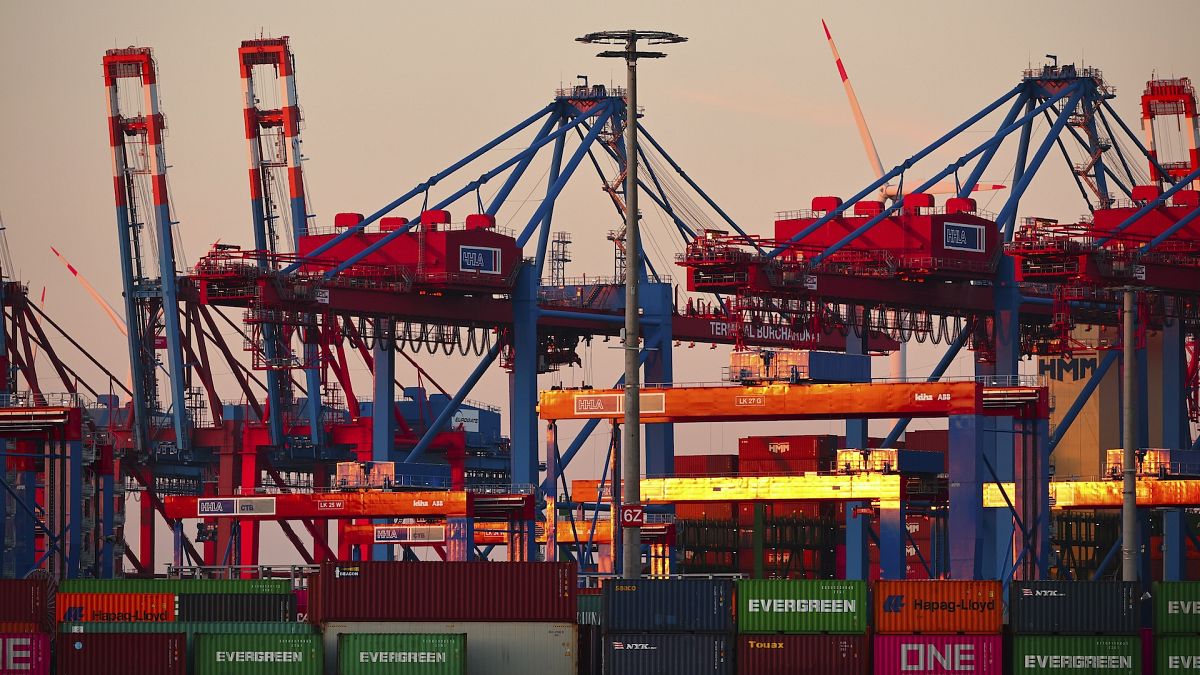A robust services sector and better employment prospects helped lift economic sentiment in the eurozone and European Union in August. The DAX hit record highs as inflation fell across German states.
Economic sentiment in the eurozone and the European Union picked up in August, spurred by a robust performance in the services sector and a recovery in employment prospects.
The Economic Sentiment Indicator edged higher in both the European Union, rising by 0.4 points to 96.9, and the euro area, increasing by 0.6 points to 96.6, according to data released by the European Commission on Thursday.
The eurozone’s figure exceeded economists’ predictions of 95.8, reaching its highest point since May 2023, though it still falls short of its pre-pandemic average.
The Employment Expectations Indicator also posted a more substantial increase in both regions, reversing several months of decline. In the European Union, the employment gauge rose by 0.9 points to 99.6 while, in the euro area, it climbed by 1.3 points to 99.2. Nevertheless, the Commission noted that the employment gauge remains slightly below its long-term average of 100.
Consumer confidence largely unchanged
The broad improvement in economic sentiment was driven by heightened confidence in industry, services, and retail trade, while confidence among consumers and in the construction sector remained largely unchanged. Among the EU’s largest economies, France posted the most significant gain, with a 4.3-point rise.
This improvement aligns with August business surveys, such as the Purchasing Managers’ Index (PMI), which highlighted a substantial expansion in France’s services sector. Activity reached its highest level since May 2022, supported by the upcoming Olympic Games in Paris.
Economic sentiment also strengthened in Spain (+1.3) and the Netherlands (+0.9), while Poland saw a modest uptick (+0.3). However, the sentiment deteriorated in Germany (-1.7) and Italy (-1.2).
Services confidence improved by 0.6 points, driven by a sharp rise in managers’ demand expectations and a more optimistic view of the past business situation.
Industry confidence edged up slightly in August (+0.4), buoyed by a marked improvement in managers’ production expectations and a modest boost in their assessment of finished product stocks. However, these gains were partly offset by a worsening evaluation of current order books.
DAX hits all-time highs amid easing inflation in Germany
European markets remained relatively stable following the release of the economic sentiment indicators, but Thursday’s session saw the euro weaken and European stocks move higher, with Germany’s DAX index approaching record levels.
Inflation across several German federal states came in lower ahead of the nationwide inflation report, scheduled for release at 14:00 CET on Thursday, bolstering expectations on a European Central Bank’s rate cut in September.
In Bavaria, consumer prices decreased by 0.1% month-on-month and increased by 2.1% year-on-year in August, marking the lowest annual rate since April 2021.
Monthly declines in the consumer price index were also observed in Baden-Württemberg, Brandenburg, Hesse, North Rhine-Westphalia, and Saxony.
Inflation in Germany expected to fall
Economists expect Germany’s overall inflation rate to drop from 2.3% year-on-year to 2.1% in August, hitting its lowest point since April 2021.
The harmonised index of consumer prices (HICP), used by Eurostat to calculate broader eurozone inflation, is projected to fall from 2.6% to 2.3% year-on-year.
Following the release of the German inflation data, the euro slipped 0.3% below the 1.11 mark against the dollar, while Bund yields declined by 3 basis points.
European stocks trended higher on Thursday, with the Euro Stoxx 50 index climbing 0.9% to 4,955 points, its highest level since mid-July 2024.
Leading the gains within the Euro Stoxx 50 were Dutch chipmaker ASML Holding NV, up 2.5%, followed by Kering (+1.6%) and LVMH (+1.4%).
The German DAX index surged 0.7% to over 18,900 points, reaching a new all-time high. The top performers in the DAX were Sartorius (+2.3%), Infineon (+1.7%), and Rheinmetall (+1.6%).
Elsewhere in Europe, Italy’s FTSE MIB and France’s CAC 40 both advanced by 0.7%, while Spain’s IBEX 35 edged up 0.5%.
Read the full article here
















